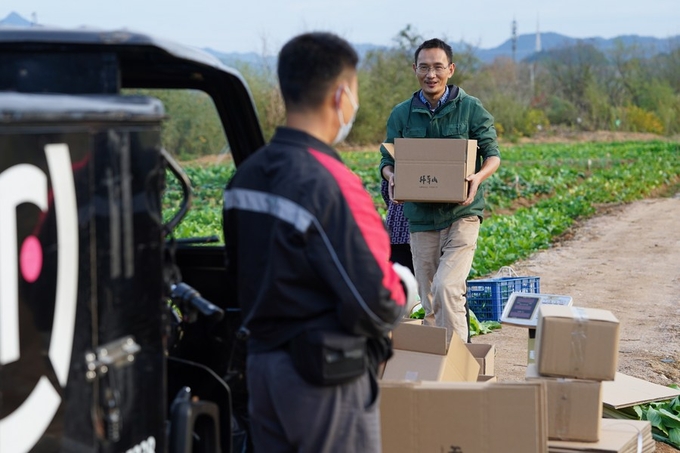November 26, 2025 | 07:09 GMT +7
November 26, 2025 | 07:09 GMT +7
Hotline: 0913.378.918
November 26, 2025 | 07:09 GMT +7
Hotline: 0913.378.918

A farmer hands a box of packaged vegetables to a deliveryman in Yixian county, Huangshan city, East China's Anhui province, Nov 24, 2022. Photo: Xinhua
After a three-year push by the State Post Bureau to expand the nationwide delivery network to include even the most remote parts of the country, some 95 percent of Chinese villages now have access with the rest to follow, the bureau said recently.
With over 100 billion parcels delivered in China last year, the bureau said that it intends to continue its expansion into rural areas this year, and also ensure that the rights of couriers are improved and protected.
China has 990 large parcel delivery centers in rural counties and 278,000 parcel delivery stations located in villages.
The bureau will focus on improving the parcel delivery system in rural counties, towns and villages to consolidate the achievements of the three-year campaign to promote the parcel delivery network in rural areas, said Hou Yanbo, spokesman for the bureau.
It will continue to build parcel delivery centers in counties and villages, and encourage various parcel delivery companies to share more resources in rural areas, he said.
In some rural areas, a single courier can handle parcels from different companies, saving costs and increasing benefits.
As almost all administrative villages across China have access to bus services, the bureau said it has encouraged placing parcels on scheduled buses to rural areas to reduce logistics costs.
Hou said there will also be a greater focus put on improving the protection of couriers' legal rights.
Enterprises have been asked to ensure that they sign work contracts with couriers and make social insurance contributions in accordance with the law. The bureau has also asked companies to come good with their promises to increase delivery fees in order to boost couriers' incomes.
Delivery companies have been encouraged to better handle complaints filed by customers, establishing a system for couriers to defend themselves against unfair complaints, and setting up a counseling hotline for couriers.
China's parcel delivery business has boomed in the past decade. Last year, the country handled 110.5 billion parcels, the most of any country in the world in terms of volume. Among them, about one-third of parcels were collected and delivered in rural areas.
Thanks to the expansion of the parcel delivery network, agricultural produce from rural areas can be delivered and sold more easily in cities, benefiting farmers and their businesses.
(Chinadaily)

(VAN) Brazil's COP30 presidency pushed through a compromise climate deal on Saturday that would boost finance for poor nations coping with global warming but that omitted any mention of the fossil fuels driving it.

(VAN) Poultry farmers in the UK have been warned that they could face one of the worst winters yet for bird flu.

(VAN) Prices of main-crop paddy have risen sharply, with jasmine rice hitting 16,100 baht per tonne — the highest level in years.

(VAN) In Brazil, FAO unveiled a series of reports and initiatives showing how sustainable agrifood systems are a solution to the climate crisis.

(VAN) With names like neodymium and dysprosium, rare-earth elements sound exotic — and their perceived scarcity has only added to the mystique.

(VAN) In a new study published in Trends in Biotechnology, researchers used a gene-editing technology called CRISPR to increase a fungus's production efficiency and cut its production-related environmental impact by as much as 61%- all without adding any foreign DNA.

(VAN) A top official in Beijing’s Cop delegation says China is committed to clean energy – but US’s absence is a problem.